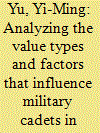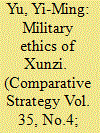| Srl | Item |
| 1 |
ID:
141170


|
|
|
|
|
| Summary/Abstract |
Previous studies have unanimously agreed that despite the challenges of postmodernism, militaries should not and cannot be governed using an occupational model. However, what the notion of the value type of a postmodern army is should be clarified. This study investigates the changing values of postmodern militaries caused by external economic factors. For this research, a questionnaire and long-term investigation method were adopted to collect 262 cadet samples from the Taiwanese military, navy, and air force. The results of a cluster analysis showed that the cadets primarily comprised 3 types, that is, the devotion (DE) type, socially competent (SC) type, and the comfortable (CO) type. This study shows that the socially competent type best satisfies the value demands of the military. In addition, the enlistment motivations of this type of cadet are generally to alleviate family financial burdens, non-economic-related reasons, self-actualization, and patriotism.
|
|
|
|
|
|
|
|
|
|
|
|
|
|
|
|
| 2 |
ID:
150101


|
|
|
|
|
| Summary/Abstract |
Confucius and Mencius intentionally refrained from further discussing military actions because of their consistent belief of ethical governance, thus creating a theoretical gap. This study explores the military ethics in Confucianism by analyzing Xunzi. Xunzi transformed the negative attitude toward war promoted by Confucius and Mencius and argued that war does not contradict the values of humaneness and justice because people supporting these values condemn those who violate such values. One must prevent violence and eradicate evil through war, rather than using war for personal incentives to protect the normal operation of a society. Xunzi promoted the use of temporary military actions as a means for restoring social order, changing the traditional Confucian antiwar perspective of “those who are benevolent have no enemy” advocated by Confucius and Mencius.
|
|
|
|
|
|
|
|
|
|
|
|
|
|
|
|